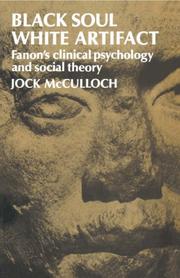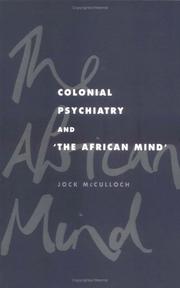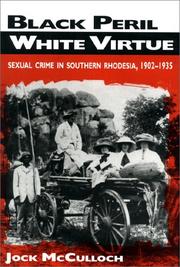| Listing 1 - 10 of 10 |
Sort by
|

ISBN: 0521247004 0521520258 0511558554 Year: 1983 Publisher: Cambridge Cambridge University Press
Abstract | Keywords | Export | Availability | Bookmark
 Loading...
Loading...Choose an application
- Reference Manager
- EndNote
- RefWorks (Direct export to RefWorks)
The death of Frantz Fanon at the age of thirty-six robbed the African revolution of its leading intellectual and moral force. His death also cut short one of the most extraordinary intellectual careers in contemporary political thought. Fanon was a political psychologist whose approach to revolutionary theory was grounded in his psychiatric practice. During his years in Algeria he published clinical studies on the behaviour of violent patients, the role of culture in the development of illness and the function of the psychiatric hospital as a social milieu. These papers illuminate Fanon's political theory, expose weaknesses in his concept of political consciousness and liberation, and contain a 'secret history' explaining the tide of revolutionary movements in the Third World.
Psychiatry --- Sociology of culture --- Fanon, Frantz --- Africa --- Black race. --- Mental illness --- Political psychology. --- Blacks --- Ethnopsychology --- Race relations. --- Social conditions --- Social aspects. --- Psychology. --- Arts and Humanities --- History --- Fanon, Frantz, --- Colonial influence. --- Mass political behavior --- Political behavior --- Political science --- Politics, Practical --- Psychology, Political --- Psychology --- Social psychology --- Negro race --- Race --- Psychological aspects --- Fānūn, Frānz, --- פנון, פרנץ, --- فانون، فرانتس --- فانون، فرانز --- فانون، فرانس --- Faanon, Faraanz, --- Black people

ISBN: 0521453305 9780521034807 0521034809 9780521453301 9780511598548 0511598548 Year: 1995 Publisher: Cambridge : Cambridge University Press,
Abstract | Keywords | Export | Availability | Bookmark
 Loading...
Loading...Choose an application
- Reference Manager
- EndNote
- RefWorks (Direct export to RefWorks)
In this history of the practice and theoretical underpinnings of colonial psychiatry in Africa, Jock McCulloch describes the clinical approaches of well-known European psychiatrists who worked directly with indigenous Africans, among them Frantz Fanon, J. C. Carothers and Wulf Sachs. They were a disparate group, operating independently of one another, and mostly in intellectual isolation. But despite their differences, they shared a coherent set of ideas about 'the African mind', premised on the colonial notion of African inferiority. In exploring the close association between the ideologies of settler societies and psychiatric research, this intriguing study is an attempt to explore colonial science as a system of knowledge and power.
Psychiatrie --- Imperialism --- National characteristics, African --- Psychiatry --- Impérialisme --- Caractéristiques nationales africaines --- Aspect politique --- Histoire --- Psychological aspects --- Political aspects --- History --- Aspect psychologique --- Africa --- Afrique --- Colonization --- Colonisation --- #SBIB:39A9 --- #SBIB:39A73 --- -National characteristics, African --- -Medicine and psychology --- Mental health --- Psychology, Pathological --- African national characteristics --- Colonialism --- Empires --- Expansion (United States politics) --- Neocolonialism --- Political science --- Anti-imperialist movements --- Caesarism --- Chauvinism and jingoism --- Militarism --- Medische antropologie / gezondheid / handicaps --- Etnografie: Afrika --- -History --- Eastern Hemisphere --- -Psychological aspects. --- National characteristics, African. --- Community Psychiatry --- Knowledge, Attitudes, Practice. --- Politics --- Psychological aspects. --- History. --- history --- -Medische antropologie / gezondheid / handicaps --- -African national characteristics --- Impérialisme --- Caractéristiques nationales africaines --- Medicine and psychology --- Political aspects&delete& --- a --- #SBIB:39A3 --- #SBIB:327.4H21 --- Antropologie: geschiedenis, theorie, wetenschap (incl. grondleggers van de antropologie als wetenschap) --- Kolonisatie / dekolonisatie / post-kolonisatie --- Arts and Humanities
Book
ISBN: 1283666022 1782040420 1847010598 9781431407187 9781847010599 Year: 2012 Publisher: [Woodbridge] : James Currey,
Abstract | Keywords | Export | Availability | Bookmark
 Loading...
Loading...Choose an application
- Reference Manager
- EndNote
- RefWorks (Direct export to RefWorks)
South Africa's gold mines are the largest and historically among the most profitable in the world. Yet at what human cost? This book reveals how the mining industry, abetted by a minority state, hid a pandemic of silicosis for almost a century and allowed miners infected with tuberculosis to spread disease to rural communities in South Africa and to labour-sending states. In the twentieth century, South African mines twice faced a crisis over silicosis, which put its workers at risk of contracting pulmonary tuberculosis, often fatal. The first crisis, 1896-1912, saw the mining industry invest heavily in reducing dust and South Africa became renowned for its mine safety. The second began in 2000 with mounting scientific evidence that the disease rate among miners is more than a hundred times higher than officially acknowledged. The first crisis also focused upon disease among the minority white miners: the current crisis is about black migrant workers, and is subject to major class actions for compensation. Jock McCulloch was a Legislative Research Specialist for the Australian parliament and has taught at various universities. His books include 'Asbestos Blues'. Southern Africa (South Africa, Namibia, Lesotho, Swaziland & Botswana) : Jacana.
Gold mines and mining --- Silicosis --- Gold miners --- Gold prospectors --- Prospectors, Gold --- Miners --- Lungs --- Gold discoveries --- Gold extraction (Mining) --- Gold fields --- Gold mining --- Gold rush --- Gold rushes --- Goldfields --- Goldmining --- Goldrush --- Goldrushes --- Sites, Gold mining --- Mines and mineral resources --- Health aspects --- History --- Health and hygiene --- Dust diseases --- Jock McCulloch. --- South African gold mines. --- Southern Africa. --- black migrant miners. --- class actions. --- mining industry. --- pandemic. --- silicosis crisis. --- tuberculosis. --- Bergbau. --- Lagerstätte. --- Abbau. --- Gesundheit. --- Bergmann. --- Arbeitsbedingungen. --- Berufskrankheit. --- Berufsunfähigkeit. --- Erwerbsunfähigkeit. --- Südafrika.

ISBN: 0710094116 Year: 1983 Publisher: London : Routledge and Kegan Paul,
Abstract | Keywords | Export | Availability | Bookmark
 Loading...
Loading...Choose an application
- Reference Manager
- EndNote
- RefWorks (Direct export to RefWorks)

ISBN: 9780253337283 Year: 2000 Publisher: Bloomington (Ind.) : Indiana university press,
Abstract | Keywords | Export | Availability | Bookmark
 Loading...
Loading...Choose an application
- Reference Manager
- EndNote
- RefWorks (Direct export to RefWorks)
"In the period from 1902 until the mid-1930s, Southern Rhodesia was swept by a series of panics, known by the name Black Peril, that were precipitated by the presumed sexual threat posed by black men to white women. Tension over Black Peril provoked a flood of legislation designed to control the sexuality of African men and women and the sexual "transgressions" of white females, including the introduction of the death penalty for attempted rape. Over the next decades more than twenty men were executed, though many were innocent of any serious crime." "As Jock McCulloch shows, the panics were complex events which encompassed such issues as miscegenation, prostitution, the management of venereal disease, the politics of concubinage, and the construction of whiteness."--Jacket.
Race relations. --- Rassenbeziehung. --- Rassenverhoudingen. --- Seksuele misdrijven. --- Sex crimes --- Sex crimes. --- Sexualdelikt. --- History --- 1900-1999. --- Simbabwe. --- Zimbabwe --- Zimbabwe. --- Race relations
Book
ISBN: 9781782040422 9781847010599 Year: 2012 Publisher: Suffolk Boydell & Brewer
Abstract | Keywords | Export | Availability | Bookmark
 Loading...
Loading...Choose an application
- Reference Manager
- EndNote
- RefWorks (Direct export to RefWorks)

ISBN: 0253337283 Year: 2000 Publisher: Bloomington Indiana university press
Abstract | Keywords | Export | Availability | Bookmark
 Loading...
Loading...Choose an application
- Reference Manager
- EndNote
- RefWorks (Direct export to RefWorks)
Sex crimes --- History --- Zimbabwe --- Race relations
Book
ISBN: 0199534853 9786611770136 1281770132 0191560081 9780191560088 9780199534852 0191608963 1383044716 Year: 2023 Publisher: Oxford : Oxford University Press,
Abstract | Keywords | Export | Availability | Bookmark
 Loading...
Loading...Choose an application
- Reference Manager
- EndNote
- RefWorks (Direct export to RefWorks)
Until the mid-1960s, asbestos had a reputation as a lifesaver. In 1960, it became known that exposure to asbestos can cause mesothelioma, a virulent and lethal cancer. Yet the bulk of the world's asbestos was mined after 1960. This is a global history of how the asbestos industry defended their product throughout the 20th century.
Asbestos industry. --- Asbestos industry --- History, Modern 1601 --- -Silicates --- Neoplasms, Mesothelial --- Adenoma --- Minerals --- History --- Neoplasms, Glandular and Epithelial --- Silicic Acid --- Inorganic Chemicals --- Humanities --- Neoplasms by Histologic Type --- Silicon Dioxide --- Silicon Compounds --- Neoplasms --- Chemicals and Drugs --- Diseases --- Asbestos --- History, 20th Century --- Mesothelioma --- Business & Economics --- Industries --- Health aspects --- Corrupt practices --- Health aspects. --- Corrupt practices. --- Building materials industry --- Mineral industries
Book
ISBN: 9811983275 9811983267 Year: 2023 Publisher: Singapore : Springer Nature Singapore : Imprint: Palgrave Macmillan,
Abstract | Keywords | Export | Availability | Bookmark
 Loading...
Loading...Choose an application
- Reference Manager
- EndNote
- RefWorks (Direct export to RefWorks)
This open access book charts how South Africa’s gold mines have systematically suppressed evidence of hazardous work practices and the risks associated with mining. For most of the twentieth century, South Africa was the world’s largest producer of gold. Although the country enjoyed a reputation for leading the world in occupational health legislation, the mining companies developed a system of medical surveillance and workers’ compensation which compromised the health of black gold miners, facilitated the spread of tuberculosis, and ravaged the communities and economies of labour-sending states. The culmination of two decades of meticulous archival research, this book exposes the making, contesting, and unravelling of the companies’ capacity to shape – and corrupt – medical knowledge.
Occupational health services. --- Public health. --- Science—History. --- Africa—History. --- Imperialism. --- Occupational Health. --- Public Health. --- History of Science. --- African History. --- Imperialism and Colonialism. --- Colonialism --- Empires --- Expansion (United States politics) --- Neocolonialism --- Political science --- Anti-imperialist movements --- Caesarism --- Chauvinism and jingoism --- Militarism --- Community health --- Health services --- Hygiene, Public --- Hygiene, Social --- Public health services --- Public hygiene --- Social hygiene --- Health --- Human services --- Biosecurity --- Health literacy --- Medicine, Preventive --- National health services --- Sanitation --- Employee health services --- Medical care --- Medicine, Industrial --- Gold miners --- Gold mines and mining --- Lungs --- Migrant labor --- Diseases --- Health aspects --- Dust diseases
Book
ISBN: 9789811983276 Year: 2023 Publisher: Singapore Springer Nature Singapore :Imprint: Palgrave Macmillan
Abstract | Keywords | Export | Availability | Bookmark
 Loading...
Loading...Choose an application
- Reference Manager
- EndNote
- RefWorks (Direct export to RefWorks)
| Listing 1 - 10 of 10 |
Sort by
|

 Search
Search Feedback
Feedback About UniCat
About UniCat  Help
Help News
News